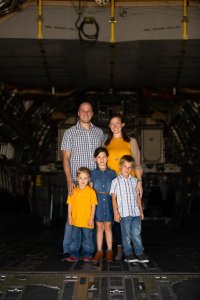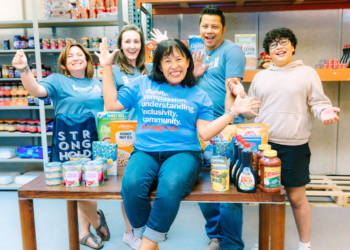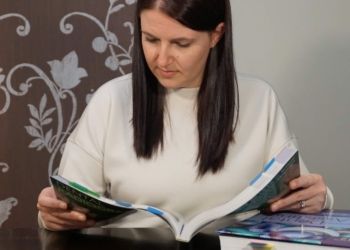“Alison?” Knock, knock. “Alison!”
Through her haze in the front seat, Air Force wife Alison Evans slurred the pieces together. She and her three young children were in her van, parked in their Sacramento garage while the engine ran. Her daycare provider, for some reason, was there calling her name. The garage door was blessedly open while the kids fussed from the backseat.
Then, it all came flooding back: her husband being gone again for a mission. The percolating illness, leaving Evans feeling like death. The isolation from her family across the country. The desperate attempt to get through her work and mothering duties by medicating with alcohol and Xanax. The drive to pick the kids up from daycare and back.
And the parking in the garage just before passing out.
“That was my moment,” the 35-year-old personal trainer says. “I was just ready for something else.”
“Something else” has morphed into a reached goal that Evans — and her supportive community, including those stationed with her at Travis Air Force Base — is extraordinarily proud of: 1000 days of sobriety.
Slow slip
Evans grew up in Georgia and South Carolina, an average American teenager who loved to dance competitively. The first time she was offered alcohol, she declined and immediately felt uncomfortable. But one year later, around age 16, Evans transferred schools and “started going with the wrong crowd,” as she explains. That meant partying and drinking whenever she could, or “whenever we could get someone to buy booze for us.”
“I was always the one to go a step above everyone else,” she says. “I always took it one step further.”
Evans wasn’t picky; beer, wine or liquor would do. As the years passed, drinking regularly just became part of her normal routine. Having kids changed her habits slightly, but the “mommy wine” culture made binging too easy to resume once each pregnancy finished.
“I couldn’t wait until the weekend, because then I could really consume what I wanted to consume, which was upwards of two bottles,” she explains. “It became a way to relax and self-medicate.”
From the outside, Evans’ life looked enviable. She was married to an Air Force major and had three beautiful children, a master’s degree and a school counseling job. The 349th Air Mobility Wing even named her its “Key Spouse of the Year” in 2016.
“But as it got worse, I felt ashamed,” she admits. “Even if I went out, I could feel my face turning red because I felt like people knew my dirty little secret.”
And so the alcohol usage intensified, with Evans often getting through her days hungover or buzzed. At her husband’s suggestion, she started seeing a therapist in early 2014, eventually uncovering the truth about Evans’ connection between anxiety and alcohol. The nugget of insight made her feel like she could better moderate her drinking, leading to a 100-day alcohol fast.
But once Evans had her third child, “it was all downhill from there,” she says. After two cross-country trips that morphed into benders — so much so that she could not perform her duties as a bridesmaid at a friend’s wedding — the addict knew that her marriage, motherhood and livelihood were on the line.
“I know now it was just such compounded emotions,” Evans said. “I wanted to numb myself from it all.”
She tried Alcoholics Anonymous meetings, but its philosophy didn’t quite click. Then came January 24, 2017, and the close call in her garage. Thankfully, her daycare provider had followed Evans home on a hunch and saved the family from possible catastrophe.
Bouncing back

“You know how you have that boyfriend you keep breaking up with and getting back together again? Then you just hit that point where you know you’re done?” Evans asks. “I hit that hard. I had that moment of clarity.”
Her children safe with the daycare provider, Evans slept it off. The next day, as she was still recovering, her van wouldn’t start.
Evans took it as a sign and stumbled to a neighbor’s house to ask for help. She knew that there might be dangerous physical consequences if she tried to quit cold-turkey. And she was right; her blood-alcohol level was sky-high, leading to a trip to the hospital before admitting herself to a detox center.
Her husband caught a red-eye back from Hawaii. After a few days of detoxing, first at the center and then at home, Evans felt ready to return to work.
She was free.
“It’s been smooth sailing since,” Evans beams.
Evans now holds a second master’s degree — this time in Exercise Science — and a growing personal training/recovery coaching clientele both locally and online. Her business is appropriately called Teetotally Fit, where she often incorporates themes from both fitness and abstaining. Clients trying to get either in shape, off booze or both come for her no-judgment, been-there-conquered-that style.
On October 22, 2019, Evans shared the exciting news on Teetotally Fit’s Instagram and Facebook pages: she had not touched a drop of alcohol for exactly 1000 days.
“I don’t need alcohol to ‘survive’ motherhood. I don’t need it to enhance or bond in my marriage,” she wrote. “I don’t need it to attend weddings, events, concerts, or to celebrate! I don’t need it when times get tough, and emotions run high because those moments are temporary…Who I am without wine or beer or liquor running through my veins is ENOUGH!”
Indeed. Instead of craving alcohol as she once did, Evans now feels unchained from its vicious grasp.
“When I look back at who I used to be, never in my wildest dreams did I think I would get to this point,” Evans says, her voice replete with awe. “[One thousand days] is more than just a number. It’s defining who I am now — someone who is completely new and who has grown into her true self.”
If you or a loved one need help with an alcohol addiction, please call the U.S. Department of Health & Human Services’ Substance Abuse & Mental Health Services Administration 24/7 hotline at 1-800-662-HELP (4357).
Read comments







































